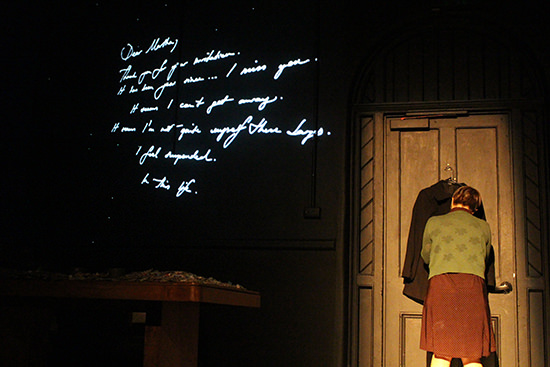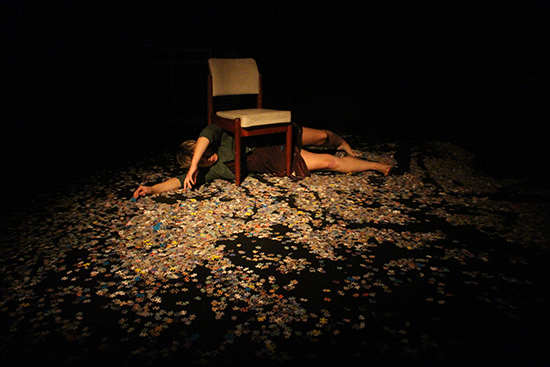Tea, Elvis & the magical mundane
Nerida Dickinson: Samantha Chester, The Astronaut

Samantha Chester, The Astronaut
“I have measured out my life with coffee spoons,” says TS Eliot’s J Alfred Prufrock. In The Astronaut, Samantha Chester measures her protagonist’s withdrawal from the world in cups of tea, jigsaw puzzles and weather reports, punctuated by Elvis Presley movies and replays of the 1969 moon landing.
Gently mesmerising, the absence of narrative movement emphasises the sense of life passing by Gwen, a composite of women from Chester’s family. She rises with smooth confidence from her armchair by the television, makes a cup of tea, carries it about the room and nestles it in its allocated place in the mounds of jigsaw puzzle pieces strewn across her table. The careful progressive arrangement of tea cups sends puzzle pieces tumbling to the floor in a clatter as Gwen takes the next unperturbed steps of her ritual, sorting through cassette tapes. Inserting the chosen tape in the machine and listening as she picks over puzzle pieces, we hear Chester’s voice reminiscing about her childhood, from the minutiae of the movement of doors to a description of mandarin trees growing along a fence. The work is built from repetition of these rituals, along with delicately interspersed memories of the moon landing and politely declined invitations to social events.
The mundane takes centre stage, the kitsch of Elvis Presley movies attaining hallowed status in the shrine of memory. The shock of Presley’s death echoes some unspecified trauma that hides at the centre of the performance, with distorted sound and tortured movements suddenly marking the pivotal moment without revealing details. Chester shares her own memory complete with childhood confusion, shock and betrayal; someone has left and Gwen subsequently isolates herself.
Chester is a constantly engaging presence, a small smile attracting and holding the eye both as she moves and as she embodies stillness. She constructs regular patterns to structure Gwen’s rituals, fixing attention in each moment. Her total absorption in a mandarin is compelling, as she loses herself in the smell, examines the texture and then gobbles the segments down in a citrus orgy of consumption. The choreography is stylised and restrained, echoing the constraints of Gwen’s housebound life.

Samantha Chester, The Astronaut
Director Frances Barbe resists the temptation to use the moon landing motif as a metaphor, Gwen’s interest in space exploration instead leading her to find the cracks in her existence. Matthew Osborne’s tight lighting design—featuring whimsical video projections of a bicycle moving across the surface of a lampshade and evoking the course of a rainy afternoon and evening—drives proceedings. Patterned cracks craze their ways along the wall, tempting Gwen to trace their sharp edges before they fade into troubling mysterious reminders. Composer Ekrem Mulayim’s beautiful soundscape evokes detached, timeless calm throughout.
Samantha Chester’s biographical inspiration and choreographed movement produce an engagingly atmospheric work, her stylised stillnesses creating moments that flow together to suggest the life of someone stepping out of the rhythm of the world on long, timeless afternoons.
Read a review of Samantha Chester’s 2014 work Safety in Numbers.
–
The Blue Room Theatre and Samantha Chester: The Astronaut, creator, performer Samantha Chester, director Frances Barbe, dramaturgy Julie-Anne Long, design Isabel O’Neill, composer Ekrem Mulayim, lighting, sound design Matthew Osborne, collaborator/operator Timothy Green; The Blue Room Theatre, Perth, 21 June-9 July
RealTime issue #133 June-July 2016






